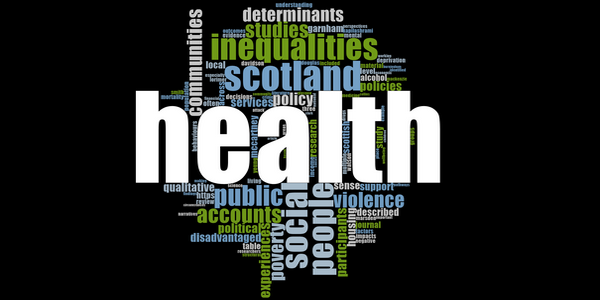
The Health-Justice Nexus: Crime and Justice as Social Determinants of Health in Scotland
The Health-Justice Nexus is a five-year programme of research funded by the Chief Scientist Office (Scotland). Our mission is to improve the health of Scotland's most disadvantaged communities by examining how direct and indirect contact with the justice system variously impact on health outcomes, and identifying opportunities for improvement.
Traditionally, research on health inequalities and crime/justice operates in separate silos, despite poverty, stigma, and discrimination being common factors. This programme brings these research areas together to identify strategies to reduce health and justice-related inequalities and seek opportunities to enhance wellbeing in the most affected communities.
Background: Improving Health and Wellbeing Among Justice-Affected People and Communities
The Scottish Government wants to enhance the focus on health in the justice system, encompassing police, prison officers, and justice social workers. Evidence shows that individuals in custody, under supervision, or on post-release licenses often have significant health needs that go unmet by current healthcare systems. This gap means that many do not receive the support they require. For example, it can be challenging for some people leaving prison to register with a GP due to a lack of a fixed address.
Access to healthcare is just one part of the issue. Scotland's poorest communities often experience greater health problems, have higher imprisonment rates, and face shorter life expectancies, compared to wealthier communities. The Scottish Government acknowledges these inequalities as unjust and is committed to reducing them. Despite these efforts, recent data suggests that health inequalities are widening in Scotland, with avoidable deaths increasing in the most deprived areas since 2014.
What We're Doing
In collaboration with community members - including those with direct experience of the justice system - our programme will:
- Identify Promising Approaches: Review existing research on health-justice intersections to find effective strategies for improving health and wellbeing.
- Investigate Technology: Explore how digital and phone-based technologies can be used to improve access to healthcare, both in the community and in prisons, and consider the potential impact on inequalities.
- Examine Preventative approaches in Policing: Research Police Scotland's evolving practices to promote and support community wellbeing, from the contrasting perspectives of police, support services and communities.
- Assess Opportunities for Improving Health and Wellbeing: Investigate community experiences of living in highly policed areas, where poor health outcomes persist; explore what happens when individuals serving long-term sentences transition out of prison; and assess the effectiveness of peer-support for prisoners who use drugs.
In undertaking this research, we are committed to working closely with those most impacted by health and justice-related inequalities, and to ensuring their voices are heard in research and policy work to shape Scotland's health and justice systems. For more information about our approach to working with communities, please see Community Engagement.
.jpg)



